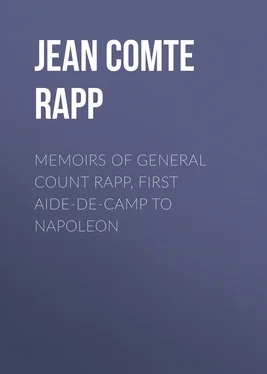Jean Comte Rapp - Memoirs of General Count Rapp, First aide-de-camp to Napoleon
Здесь есть возможность читать онлайн «Jean Comte Rapp - Memoirs of General Count Rapp, First aide-de-camp to Napoleon» — ознакомительный отрывок электронной книги совершенно бесплатно, а после прочтения отрывка купить полную версию. В некоторых случаях можно слушать аудио, скачать через торрент в формате fb2 и присутствует краткое содержание. Жанр: Биографии и Мемуары, История, foreign_edu, foreign_antique, foreign_prose, на английском языке. Описание произведения, (предисловие) а так же отзывы посетителей доступны на портале библиотеки ЛибКат.
- Название:Memoirs of General Count Rapp, First aide-de-camp to Napoleon
- Автор:
- Жанр:
- Год:неизвестен
- ISBN:нет данных
- Рейтинг книги:5 / 5. Голосов: 1
-
Избранное:Добавить в избранное
- Отзывы:
-
Ваша оценка:
- 100
- 1
- 2
- 3
- 4
- 5
Memoirs of General Count Rapp, First aide-de-camp to Napoleon: краткое содержание, описание и аннотация
Предлагаем к чтению аннотацию, описание, краткое содержание или предисловие (зависит от того, что написал сам автор книги «Memoirs of General Count Rapp, First aide-de-camp to Napoleon»). Если вы не нашли необходимую информацию о книге — напишите в комментариях, мы постараемся отыскать её.
Memoirs of General Count Rapp, First aide-de-camp to Napoleon — читать онлайн ознакомительный отрывок
Ниже представлен текст книги, разбитый по страницам. Система сохранения места последней прочитанной страницы, позволяет с удобством читать онлайн бесплатно книгу «Memoirs of General Count Rapp, First aide-de-camp to Napoleon», без необходимости каждый раз заново искать на чём Вы остановились. Поставьте закладку, и сможете в любой момент перейти на страницу, на которой закончили чтение.
Интервал:
Закладка:
Prussia at length explained herself. She required us to abandon our conquests, and threatened us with her displeasure if we refused to evacuate Germany and recross the Rhine. The demand was modest, and worthy of those who urged it. Napoleon could not finish reading the document; he threw it away contemptuously. "Does he think himself in Champagne?" said he. "Does he want to give us a new edition of his manifesto? What! does he pretend to mark out a route for our march back. Really, I pity Prussia, I feel for William. He is not aware what rhapsodies he is made to write. This is too ridiculous. Berthier, they wish to give us a rendezvous of honour for the 8th; a beauteous Queen will be a witness to the combat. Come, let us march on; and shew our courtesy. We will not halt till we enter Saxony." Then turning immediately to his secretary, he hastily dictated the following proclamation:
"Soldiers!
"The order for your return to France was issued. You were already within a few days' march of your homes: triumphal fêtes awaited you, and the preparations for your reception had commenced in the capital; but while we thus too confidently resigned ourselves to security, new plots were hatching under the mask of friendship and alliance. Cries of war have been raised at Berlin, and for two months we have been provoked with a degree of audacity which calls for vengeance.
"The same faction, the same headlong spirit, which, under favour of our internal dissensions, led the Prussians fourteen years ago to the plains of Champagne, still prevail in their Councils. If they no longer wish to burn and destroy Paris; they now boast their intention to plant their colours in the capital of our allies. They would oblige Saxony, by a disgraceful transaction, to renounce her independence, by ranking her in the list of their provinces. They seek, in fine, to tear your laurels from your brows. They expect us to evacuate Germany at the sight of their army. What madness! Let them learn that it would be a thousand times easier to destroy the great capital, than to sully the honour of the children of the great people and their allies. In their former attempt the plans of our enemies were frustrated. They found in the plains of Champagne only shame, defeat, and death; but the lessons of experience are forgotten, and there are men in whom the feelings of hatred and jealousy never become extinct.
"Soldiers, there is not one of you who would wish to return to France by any other path than that of honour. We ought not to return except by passing beneath triumphal arches.
"What! have we braved the inclemency of the seasons, the ocean and the desert, have we subdued Europe often united against us; have we extended our glory from East to West, only to return now, like deserters, after having abandoned our allies, and to be told that the French Eagle has fled in dismay before the Prussians.
"But they have already arrived at our advance posts. Let us, then, march upon them, since forbearance will not check their infatuation. Let the Prussian army experience the fate which it shared fourteen years ago. Let us teach them that if it is easy to obtain an increase of territory and power with the friendship of the great people, their enmity (which can only be provoked by the neglect of prudence and reason) is more terrible than the storms of the ocean."
Our soldiers only wished to fight. The Prussians occupied Saalfeld and Schleitz; we charged them, routed them, and made a thousand prisoners. These were the two first engagements which we had with them. I quitted Murat, whom I had been ordered to follow, and went to render an account of the affair of Schleitz to Napoleon, who had established his head-quarters some leagues in the rear, at the residence of a Princess of Reus-Lobenstein. On my arrival I found Napoleon engaged with Berthier. I informed him of the success of the Grand Duke, and of the defeat of Tauenzien. "Tauenzien!" exclaimed Napoleon, "one of the Prussian intriguers! It was well worth our while to urge on the war to such a length." He told me I might retire and take some rest, as I should be roused in a few hours to set out on a mission. I had no idea whither I was to go. I was called about 5 o'clock. The Emperor gave me a letter for King William, who at that time, I believe, held his head-quarters at Sondershausen. "You must go," said he, "as fast as you can after the King of Prussia, and deliver to him this letter from me. I ask him once more for peace, though hostilities have already commenced. You must endeavour to convince the King of the danger of his situation, and the fatal consequences which may result from it. You will return immediately and bring me his answer: I shall now march on Gera." Our baggage was still in the rear. I had no carriage; but I procured one from the coach-house of the Princess of Reus-Lobenstein, put four good horses to it, and started about six o'clock. Before I had proceeded a league on my journey, Napoleon sent after me. I returned and went to his study, where he had been occupied the whole of the night. He desired me to deliver the letter to Berthier. "Upon reflection," said he, "I will not have one of my aides-de-camp charged with such a message. You are persons of too great importance to be exposed to the chance of meeting with a bad reception." The letter was sent two days after by M. de Montesquiou: he started, I believe, from Gera. The treatment he experienced is well known: he was stopped by the Prince de Hohenlohe, at that time general-in-chief of the Prussian army, who obliged him to be present at the battle of Jena, and did not send the letter, as it is affirmed, until after the action.
Several persons in Napoleon's suite were of opinion, that if I had executed the commission with which I was at first charged, I should have come up with the King of Prussia, and the war perhaps would not have taken place. I do not think so. The gauntlet was thrown, there was no alternative but to take it up. I do not even think that Napoleon was more inclined for peace than King William.
CHAPTER XI
We were now in possession of the whole course of the Saale, and in a fair way to turn the enemy's army. The calculations of the Duke of Brunswick were completely frustrated. He had formed the idea of coming up with us on the Mainc, of occupying our wings by detached corps, and penetrating our centre before we could concentrate our forces. He still possessed all the threads of that vast spy system which had harassed France since the emigrations. He knew the force and the route marked out for several corps which were marching from Meudon, and he did not doubt of anticipating us. Napoleon took a pleasure in cherishing this illusion; he made preparations, and caused reconnaissances to be taken through the whole of that line. The Duke had no longer any doubt of having penetrated our intentions; we were to debouch by Kœnigshaften; he made certain of that; he felt perfectly convinced of it. Our movements on his centre were only a snare, a _ruse de guerre_; we wished to deceive him, in order to prevent him from debouching by the forests of Thuringen, whilst we proceeded towards Coburg and Memmingen, in woody and mountainous countries, where his cavalry would have no opportunity of acting, or at least would be deprived of its advantage. It was of the utmost importance to anticipate us, and he hurried to Kœnigshaften.
The enemy were engaged in the woods; Napoleon marched on Schleitz, sixty leagues from the presumed point of attack. The third corps quietly reposed on the 10th at Nauenburgh, in the rear of the Duke of Brunswick. Hostilities were of only two days' date, and that Prince, who was already uncovered on his left, was on the eve of being entirely cut to pieces. His communications with the Elbe were in danger; and he was nearly reduced to the same extremities as Mack, whom he had so violently censured. His advance-guard, on arriving on the Mainc, found the field unoccupied. This circumstance seemed incomprehensible; but still it never led him to suspect the danger to which he was exposed. The rout of Saalfeld alone shook the confidence which he had placed in his own safety. He hastily retraced his course. Weimar and Hohenlohe were directed to come up speedily, and the army of reserve was ordered to make a forced march. But some parties mistook their route, and others did not use sufficient despatch, so that a portion of the troops were not engaged in the battle. The Duke, who was disconcerted at a system of movements so novel to him, knew not what determination to adopt. All these marches and arrangements, so rapidly succeeding each other, formed a mass of confusion, in which he could discern neither plan nor object. The occupation of Nauenburgh relieved him from this perplexity: he saw his left wing about to be turned, or at least exposed; he would not wait longer; he hastily rallied his army of reserve, which was advancing upon Halle, and left Hohenlohe at the camp of Capellendorf to mask the retrograde movement. His troops, who had not shared the disasters of Saalfeld and Schleitz, ridiculed the beaten corps; they shouted "The King for ever! the Queen for ever!" &c. They resolved to avenge the affront offered to the Prussian arms: there were not enough Frenchmen for them. The Duke himself had resumed his confidence. On the Auerstadt road be found not more than thirty chasseurs. His communications were free; it was impossible they could be intercepted: it was not easy to surprise a skilful manœuvrer like the Duke. Hohenlohe's Prussians were encamped behind the heights of Jena: their masses extended as far as the eye could reach; they were prolonged beyond Weimar. Napoleon reconnoitred them on the evening of the 13th, and fixed the attack for the following day. In the night he distributed orders for the movements of the different corps. "As to Davoust, he must march on Apolda, so as to fall on the rear of the enemy's army. He may take whatever route he may deem most expedient; I leave that to himself, provided he take part in the battle: if Bernadotte be at hand he may support him. Berthier, issue instructions accordingly." It was ten o'clock at night; all the arrangements were made, and yet the general commanding the enemy's force flattered himself with the hope that we could not debouch. But the axe of the pioneers removed every obstacle; the rock was cut, and trenches were opened: the action commenced on the right and the left; the conflict was terrible. Davoust, in particular, was placed in a situation in which a man of less firmness might have found his courage fail him. Bernadotte refused to support him; he even forbade two divisions of the reserve cavalry, which, however, were not under his command, from taking part in the action. He paraded round Apolda, while 26,000 French troops were engaged with 70,000 picked men, commanded by the Duke of Brunswick and the King of Prussia. But this circumstance only added to the glory of the commander, whom it might have ruined. Davoust's plans were so well laid, his generals and his troops deployed with such skill and courage, that Blucher, with his 12,000 cavalry, had not the satisfaction to cut a single company. The King, the guards, and the whole army, attacked our troops without obtaining better success. Amidst the deluge of fire that surrounded them on all sides, the French preserved all their national gaiety. A soldier, whom his comrades had nicknamed the Emperor , impatient at the obstinacy of the Prussians, exclaimed, "On with me, grenadiers!—Come, follow the Emperor!"—He rushed into the thickest of the battle, the troop followed him, and the Prussian guards were penetrated. He was made a corporal: his friends remarked that he only wanted the protectorate.
Читать дальшеИнтервал:
Закладка:
Похожие книги на «Memoirs of General Count Rapp, First aide-de-camp to Napoleon»
Представляем Вашему вниманию похожие книги на «Memoirs of General Count Rapp, First aide-de-camp to Napoleon» списком для выбора. Мы отобрали схожую по названию и смыслу литературу в надежде предоставить читателям больше вариантов отыскать новые, интересные, ещё непрочитанные произведения.
Обсуждение, отзывы о книге «Memoirs of General Count Rapp, First aide-de-camp to Napoleon» и просто собственные мнения читателей. Оставьте ваши комментарии, напишите, что Вы думаете о произведении, его смысле или главных героях. Укажите что конкретно понравилось, а что нет, и почему Вы так считаете.












